I had an interview in London that by fortuitous timing ties directly into the H808 ECA (end of course assessement) that I have to complete and upload in the next 13 hours. What is more, every part of the MA in Open in Distance Education with the OU would have some application to the role for which I'd applied. Personal Development Planning (PDP), the subject of the ECA, would be imporant too, indeed it is a vital component of 'learner-driven' or 'learner-centred' education. Successful, engaged, pumping PDP is at the heart of e-learning - people must be motivated to take the initiative, to drive their learning while others support them in every way they can with appropriate resources, many of which will be 'electronically enabled,' i.e. 'e-learning'.
I have a draft of the ECA written, the choices of evidence have been made, collated and labelled.
I've already uploaded a draft so feel confident that the ETA system will handle whatever else I do.
I had the file, rather more chunky printed out and clipped into an Arch-Lever Folder than on a memory stick or zipped on the laptop so that I could review it on the train journey in and out of London. I like paper; things need to be expressed in other ways that via a QWERTY keyboard. It helps to talk, to discuss, to animate your thoughts with your hands even ... as we shall see.
On the way into town I find myself sitting with a friend who is 18 months into the Creative Writing course at Sussex Univeristy and was having a second interview with a literary agent; our respective career paths were shared. He is a professional photographer who has an online resource of stock photos targeted at UK Councils. I don't look at the ECA.
The interview, like so much I now do, is duly reflected upon, though for reasons of privacy not here as an open blog. This debrief, this self-assesment, served a dual purpose, at the front of my mind, of course, is the possible outcome and responses to the interview. And notes on how and where I felt it went well, or not so well, for future reference and to judge what improvements I might make when attending such interviews in future and how to compose my written thanks when I reply.
I recognise the purpose and value of reflection and make the time to do so
At the back of my mind, of course, as we talk, is the ECA.
Coming to the end of the interview process I felt compelled to share this sketch to add conviction to my belief that Personal Development Planning is 'at the heart of things'.
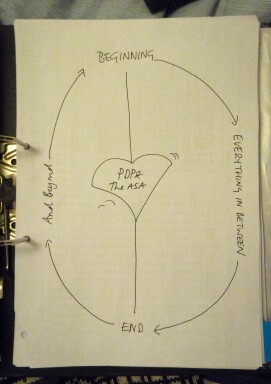
I did this earlier today to get a handle on how in one shot I now see PDP, not as a self-contained 'do it and move on unit' at the start of a course, but at the heart of what you do: at the beginning, the end, everything in between ... and beyond. (And yes, you should hear Buzz Lightyear (Tim Allen) saying it!).
It was somewhat evangelical of me, but I feel passionate about it. I believe it as a consequence of my own personal experience and from others who take this approach.
Reflection with a second person can help; it is natural that my wife would take an interest in the day's events. This is invaluable, and is a form a assessment. However, where I find I become increasingly animated regarding PDP is that I felt I still hadn't got it right, that had I seen myself in that meeting what was I doing with my hands? What else was I trying to express? Sometimes recording an interview to look over it afterwards has advantages. You need to be winkling away to find ideas and inspiration.
I'd mentioned life-long learning, that PDP can benefit both your career, how you organise a hobby, even family life.
And then I remembered this:
My interpreation, visualised, of what life-long means from H807.
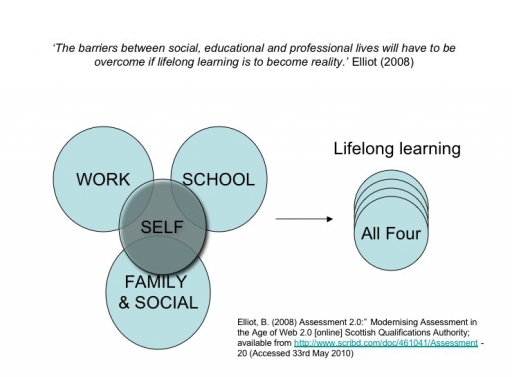
The problem I have with my sketch of 'PDP at the heart of things' is that it loops back on itself, there is no suggestion of improvement, of advancement.
I toss around further ideas like a board game, the PDP process being, for example, what happens every time you 'Pass Go' in Monopoly. Then I imagined climbing up a helter-skelter, or fairy-lights around a tree. I thought too about Kolb's cycle of development ... and then, as I was standing up waving my hands about I got it ... a great analogy would be of a glider catching a thermal and rising in a series of circles.
'A load of hot air.' My wife remarked, laughing.
And yes, I could imagine giving a presentation and a heckler saying exactly that - so I'd have to have a reply prepared. (Be prepared for anything)
With this in mind I set to work.
Earlier this week I threatened to photograph myself standing next to the family washing-line with my evidence pegged out. This is how I said I would make my choices and write the assignment. As it was raining instead I got a roll of wall-paper backing paper and stuck it to the bedroom wall with masking tape; I would draw my washing line. I have just taken this down and taped it virtically.
At the bottom I draw this.
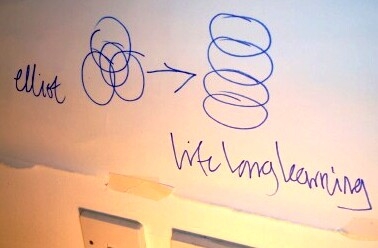
Then I go for this.
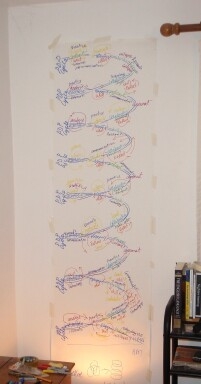
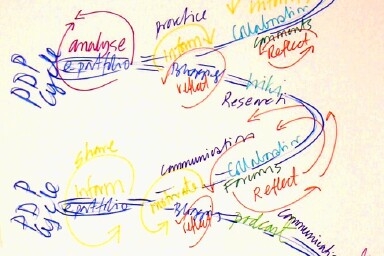
In a live presentation I would draw this from scratch on the largest sheet I could find, talking my way through it, seeking input, offering explanations.
As a video-asset I would lock off an overhead camera and draw it onto a sheet of A3 paper, possibly over a lightbox, and then use EFX to speed it up. I would then add a voice over.
There are many other ways to play with it to varying degrees of simplicity (authenticity) or ellaboration. Not least by using stock footage of a glider or Condor or some such catching a thermal with labels tagged onto the video archive footage as it played out. Indeed, going from the basic sketch it might be better still to invite course particpants to create their own expression of this PDP as an ascending cycle - say playfully spinning around in front of camera with a balsa-wood model glider with the person's name on it! Fun is good. Originality is good. Personalisation is good. This makes it memorable without needing it as an APP or an electronic alert.
The conclusion I find as convincing as the process.
The process here includes reflection, blogging, collaboration ... and could in due course include video, podcasting, presentation and moderation.
As I was able with ease to add every aspect of H808 onto this simple diagram I felt I had reached an important point, not least vindicating my methodology that might look as if it is depends on technology, but does not. Often the route to get an idea from the mind into the public domain is via face-to-face discourse, a few movements of the arms, then reaching for pen and paper.
This diagram can be draw it up differently depending on the context.
This implied versatily suggests it effectiveness.
PDP as indicated here suggests a set period to repeat or revist the process ... this ought to be expressed to occur every quarter, rather than after every cycle as suggested here with loops that might represent a typical OU unit of two weeks and the activites one engages with along the way.
A productive day then.